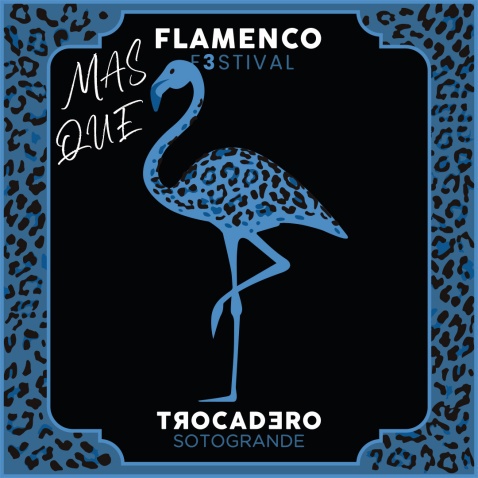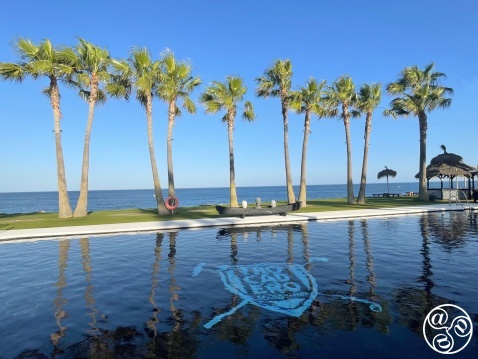
Flamenco Festival, Trocadero. Sotogrande Summer 2024 |
|
Flamenco Festival Trocadero Sotogrande 2024
Contemporary music and dance festivals in Andalucia
by Tony Bryant
The fourth edition of the Trocadero flamenco festival in Sotogrande took place at the Trocadero Beach Club and Restaurant from 3 to 16 August 2024. The Trocadero 'mas que flamenco' festival presented names from the world of flamenco, and, as with last year’s edition, some performers that do not fit into the flamenco category.
Is flamenco being dropped from the festival title?
The festival began in 2021 and the first two editions presented renowned flamenco singers such as José Mercé, María Terromoto, Racapino Chico, Remedios Amaya and Árcangle, along with dancers like Farrucuito and Antonio Canales, and guitar maestros Tomatito and Pepe Habichuela. However, along with a reduction in the number of artistes/performances this festival presents, the organisers have begun adding popular rock and pop acts, most probably in an attempt to attract a wider audience.
Only six events comprised the 2024 edition, some with double billing, compared to more than a dozen in previous years, and of these, only one or two can be categorised as flamenco in the true sense of the word. Another unusual element for a flamenco festival is the participation of DJs.
This year’s performers are Coti, an Argentine Latin-pop singer; Pitingo, a singer who, although is capable of performing the deepest styles of orthodox flamenco, fuses light flamenco styles with soul and pop; Rebobina (along with Javier Ojeda and Modestia Aparte), a Spanish ensemble that performs a tribute to the Madrid pop scene of the 1980s (La Movida); and The Gypsy Kings, a well-established group from France with Catalan heritage that perform a blend of Catalan rumba, salsa, flamenco fusion and pop.
The festival took place at the Trocadero Beach Club and Restaurant from 3rd to 22 August 2024.
| Sat 3rd August 2024 | Coti / DJ Julio Torres |
| Sat 10th August 2024 | Pitingo / DJ Julio Torres |
| Wed 14th August 2024 | Rebobina: Rafa Sanchez (La Union) + Modestia Aparte + Javier Ojeda (danza invisible) + Kique Supermix |
| Fri 16th August | Gipsy Kings by André Reyes + Los Hitanos |
| Sat 17th August | Beret |
| Thur 22nd August 2024 | Gloria Pá Tós / DJ Fonsi Nieto |
About the artists
Coti
Roberto Fidel Ernesto Sorokin, better known as ‘Coti’, is an Argentine singer, musician and composer who began his career writing songs for some of Argentina’s top acts, before deciding on a solo career.
Born in Santa Fe (near granada city) in 1973, his first solo album (Coti), which he recorded in Buenos Aires, mixed in Miami and mastered in Madrid, was released in 2002. It contained a collection of catchy pop songs that soon began to attract attention both in Argentina, where his music was already established, and in Spain, where he quickly acquired an army of dedicated fans. Early songs such as ‘Nada fue un error’ and ‘Antes que ver el sol’ received much radio airplay in Spain, catching the attention of artistes like Shakira, who chose him as the opening act for her only concert in Spain on her Tour de la Mongosta tour in 2003.
He continued to record and perform in Spain throughout the rest of the decade. His sixth studio album was released in 2012 and was a collection of cover versions that he had previously wrote for artistes such as Enrique Iglesias, and fellow Argentinian singer Diego Torres. The following year, he transferred the copyright of the hit ‘Color Esperanza’ to the Spanish cancer association (AECC), who used it in a campaign to highlight breast cancer.
Although his popularity began to fade in Spain, he continued to gain much acclaim in his home country and throughout Latin America. However, in 2018, Coti returned to Spain for a series of acoustic solo concerts, which reestablished him as one of the country’s top rock/pop artistes, and even launched his career deep into Europe and some regions of the United States.
Pitingo
Antonio Manuel Álvarez Vélez, known artistically as Pitingo, was born in Huelva in 1980, although his introduction to the world of flamenco began in Madrid, where he went to live at a young age. It was his adopted aunt, Salomé Pavón, a relation of celebrated singers Pastora and Tomás Pavón, who introduced the youngster to a bar in the capital that was frequented by some of flamenco’s most inspirational singers, including Enrique Morente, Carmen Linares and Digo Carrasco, among a long line of others.
Already a competent singer of the fandangos and bulerías of Manolo Caracol, Pitingo’s professional career began in 2005, after he participated in a compilation album consisting of nine new acts. This was followed by his first solo album in 2006, on which he collaborated with members of the Habichuela guitar dynasty, and which was to launch him to national stardom.
Titled ‘Soulerías’ (soul to the rhythm of bulerías), the CD included his own interpretation of Killing Me Softly, which went gold and gained him much praise and recognition from critics and fans alike. The album was promoted with a tour, a show that fused pop, soul and gospel with traditional flamenco styles like fandangos, bulerías and granaínas.
Pitingo (which means pretentious in the Andalusian Gypsy language) has become one of the most sough-after singers on the summer flamenco festival circuit and he has since gone on to record a string of hits that have earned him a place among today’s young pioneering singers that have kept flamenco increasingly popular among the younger generation.
He suffered health problems during the pandemic and was admitted to hospital with an intestinal bacterium, which later passed to the lungs causing pneumonia. The singer made a complete recovery and continued to perform and record, attaining much exposure in Latin America and the USA.
He now spends his time between Spain, and his home in Miami.
Rebobina
Rebobina is a live musical show that pays homage to the groups of the golden age of Spanish pop-rock in the 1980s, in particular, the music of the groups of the La Movida Madrileña movement, which was strongly rooted in Spanish culture and marked the foundations for future modern music. This countercultural movement took place in Madrid during the country’s transition to democracy after the death of Franco and was spearheaded by bands like Meccano, and Danza Invisible, the Torremolinos band fronted by Javier Ojeda.
The music was a mixture of punk, new wave and synth-pop with an openness regarding sexual expression and drug use, and the movement quickly spread to other major cities like Barcelona and Bilbao.
Modestia Aparte
Modestia Aparte were formed in 1988 by five teenagers who were inspired by the Madrid music scene of that time, known as La Movida Madrileña. Record producer Pablo Pinilla opened the door to their commercial career after recording the band’s first album, ‘Por amor al arte’, which was at first rejected by record companies, before being snapped up by the Salamandra Discos label.
The band continued to record, later signing to Polydor Records, becoming highly successful and gaining a huge fan-base of teenagers at the beginning of the 1990s. The band toured all over Spain, playing to audiences of up to 50,000 people. The group was reduced to a duo after the other members left in 1994, and although the name continued, bad record sales and dropping audiences forced the band to split later that year.
Reforming in 2002, the band again began to enjoy success, and although new CDs have appeared, today they are more focused on live performance.
Gypsy Kings
Gipsy Kings bring Catalan flair to the Festival this summer with their blend of rumba, flamenco, salsa and pop. The group of travelling musicians formed in Arles, France, in 1979, born to gitano parents, Spanish Romanis who fled Spain in the 30s during the Civil War. They are known for adding a Catalin twist to their covers of popular English-language songs - including their 1987 track “A Mi Manera”, a cover of Frank Sinatra’s “My Way”. Other covers include Bob Marley’s “One Love” which they collaborated on with the famed reggae singer’s son Ziggy. Collectively, they have globalised rumba and flamenco music and found real success with their self titled 1987 album, which was one of few Spanish-language albums to spend 40 weeks in the US charts.
Massive in the USA, where their recordings often sell platinum, the Gypsy Kings are probably the most popular, and populist, nuevo flamenco band in the world. Famed for their 1987 hit, 'Bamboleo', they bring a distinctive French influence from their origins in the gypsy culture around Arles, Montpelier, where Spain's roma legacy overlaps the border of France. Recommended albums: Best Of, Gypsy Kings, Tierra Gitana
Also playing the 3.000 seater grandstand at Marbella's Starlite festival on Fri 19th July 2024
About the Fifth edition of the festival in 2025.
About the Fourth edition of the festival in 2024.
About the Third edition of the festival in 2023.
About the Second edition of the festival in 2022.
About the First edition of the festival in 2021.
Music and dance festivals in Andalucia
